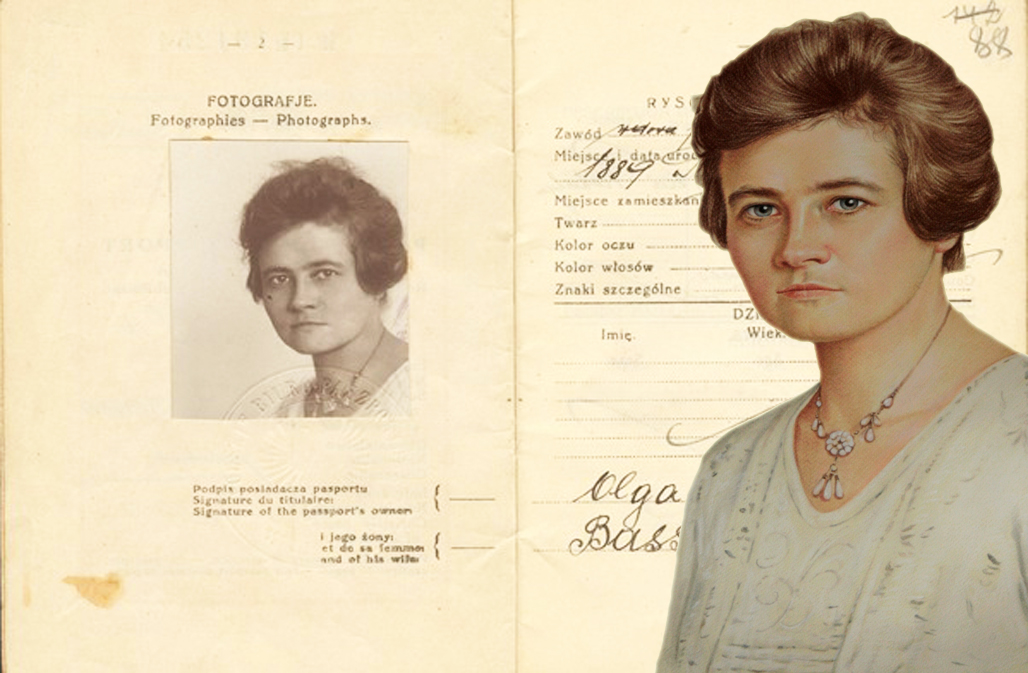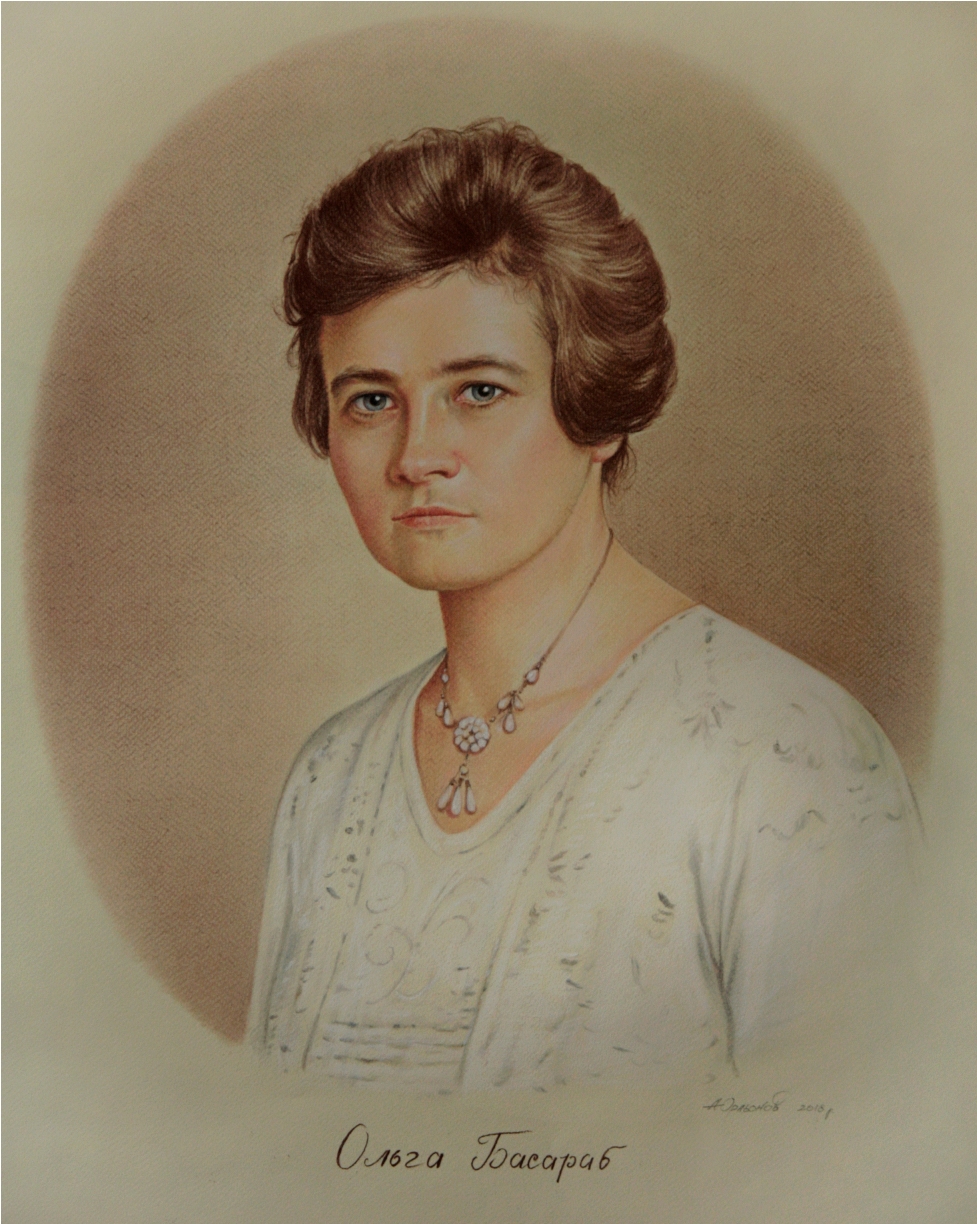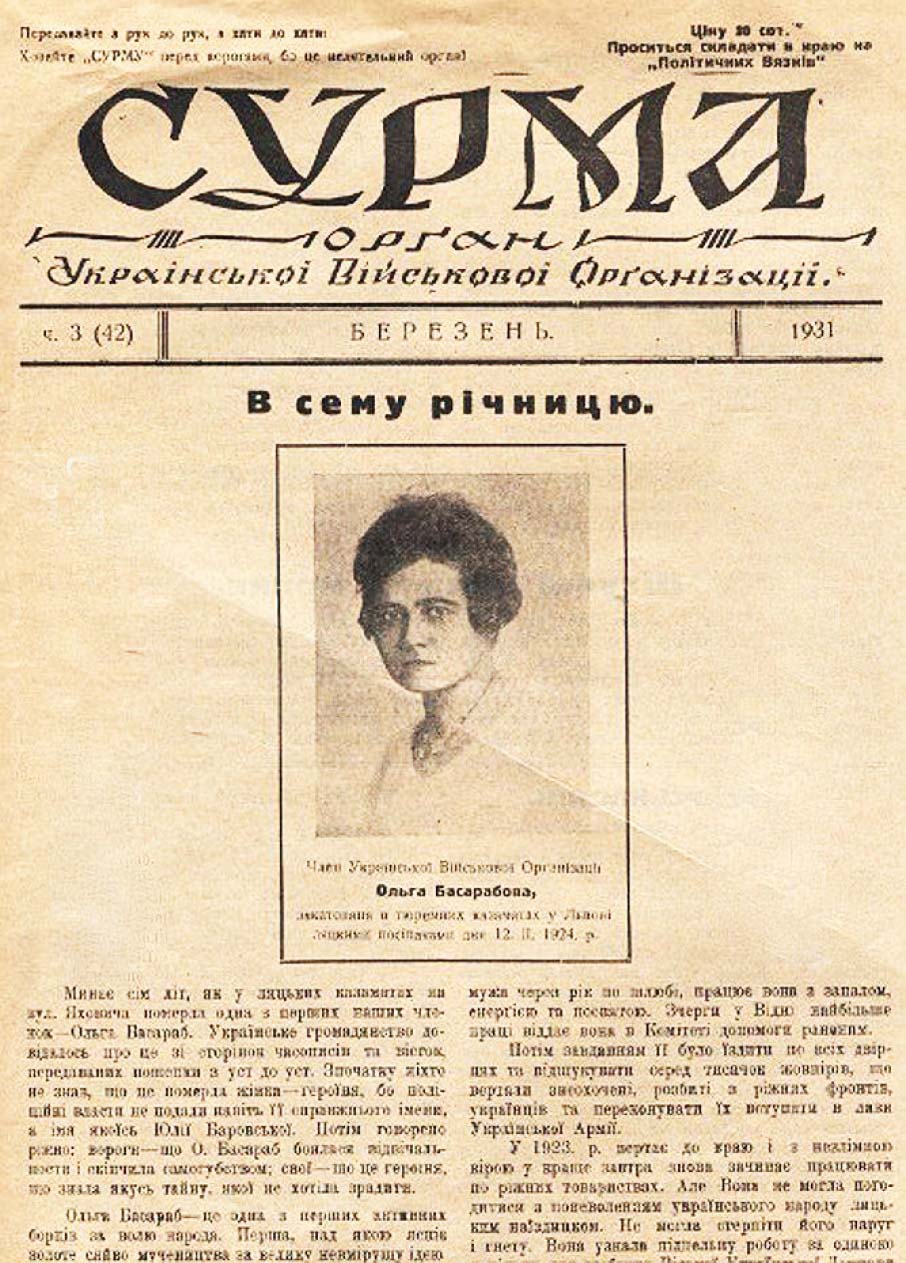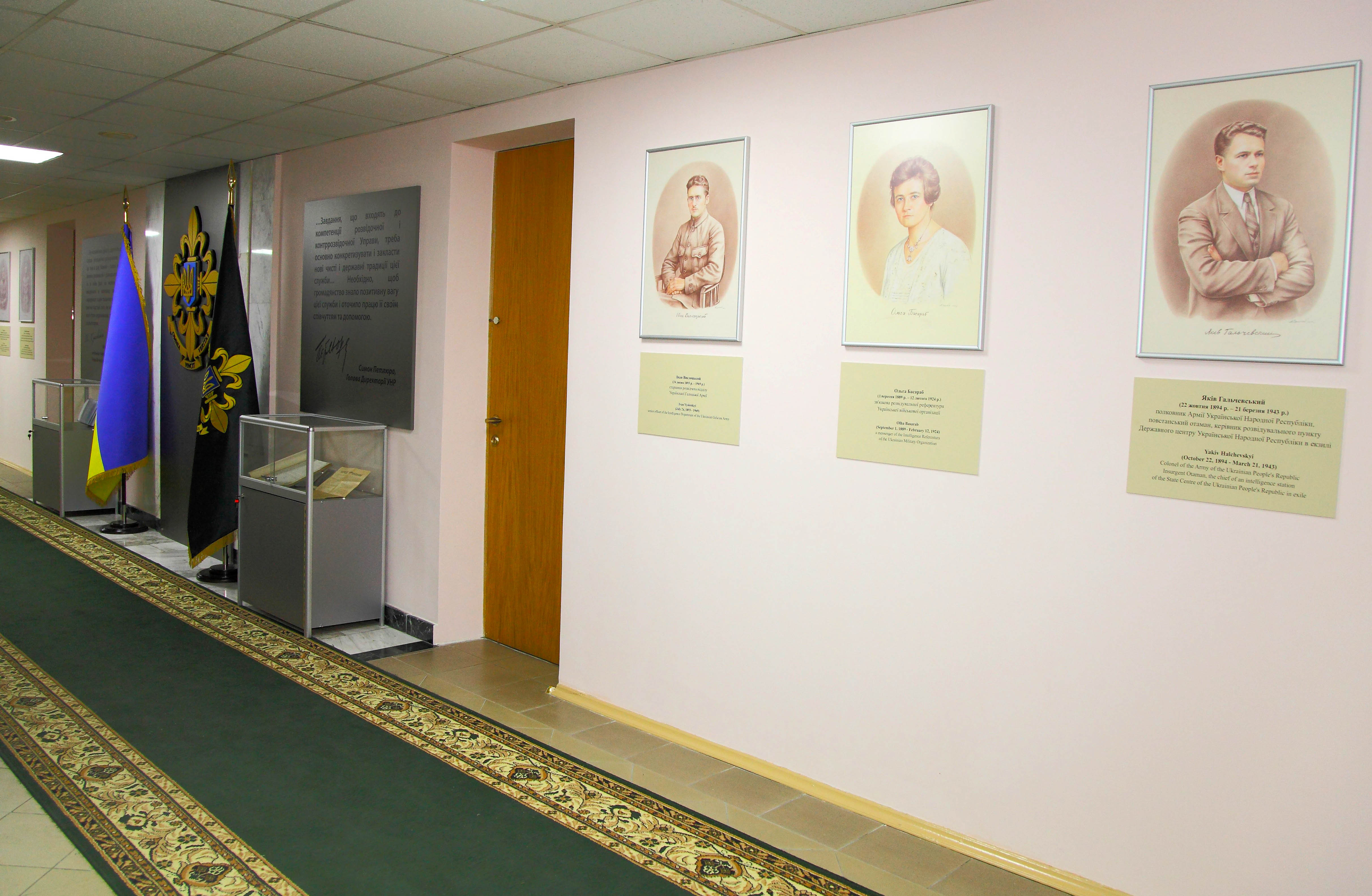Olha Basarab. In Life and on Canvas
9/1/2021

There are no separate cases or documents about O. Basarab's life and activity in the intelligence archives. There are only mentions of the “Basarab’s case”. In particular, in the materials concerning the future leader of the OUN Andriy Melnyk, who was then, in 1924, arrested and sentenced to 5 years in prison. All members of the UVO who stood the trial were called “Basarabites”. A. Melnyk was in the Batory and Bryhidky prisons in Lviv, where, according to the archives, he was severely tortured, but did not betray any of his brothers in arms. Olha Basarab did not tell about anybody either.
Olha Mykhailivna Basarab (maiden name – Levitska) was born on September 1, 1889 in the village of Pidhoroddia (now – Ivano-Frankivsk region). Her father’s family, like her mother's one, belonged to ancient and well-known clergy families, whose representatives were known even outside Galicia. She was educated in a private boarding school for girls in Weißwasser (now Bila Voda, Czech Republic), and later in the Lyceum of the Ukrainian Girls' Institute in Peremyshl (now Przemyśl, Poland) and at the Vienna Trading Academy.
There she got engaged in public activities. First of all, she co-worked with Ukrainians, in particular, she became a member of the “Sich” Society of Ukrainian Students of the University of Vienna, among whom were Dmytro Dontsov and Yevhen Konovalets. Communication with them made a significant imprint on her character and patriotic beliefs.
During the existence of the Western Ukrainian People's Republic, she was involved in government work. In Vienna, from 1918 to 1923, she worked in the accounting department of the embassy of Yevhen Petrushevych’s emigration government. Some studies mention that at that time O. Basarab also worked as the secretary of the Ukrainian embassy in Finland. Thanks to her good knowledge of foreign languages, she felt at home in the European environment and made contacts easily and effortlessly.
 These qualities were noticed by representatives of the Ukrainian Military Organization and she was involved in intelligence activities, in particular in collecting certain information abroad. Besides, she met all the requirements of intelligence agent – she was patriotic, determined, strong-willed, organized, in the past having been a member of “Prosvita”, “Sich”, “Plast”.
These qualities were noticed by representatives of the Ukrainian Military Organization and she was involved in intelligence activities, in particular in collecting certain information abroad. Besides, she met all the requirements of intelligence agent – she was patriotic, determined, strong-willed, organized, in the past having been a member of “Prosvita”, “Sich”, “Plast”.
After the liquidation of the UPR's diplomatic missions in 1923, O. Basarab moved to Lviv, where she continued her cooperation with the UVO – an underground military organization founded in 1920 by former officers of the Sich Rifle Corps and the Ukrainian Galician Army.
In UVO, Olha played the role of contact agent. She met in secret apartments with colleagues of Yevhen Konovalets, in particular with the head of intelligence Osyp Dumin, gave them directions, brought instructions, took away the intelligence materials collected by them. Thanks to her good memory, she often just remembered the necessary information and retold it in words. Everything was taking place under the highest secrecy.
The activities of the Ukrainian Military Organization in Galicia, aimed at defending Ukrainian national interests and the rights of Ukrainians, were of great concern to the government. Therefore, its interest to the activists was not accidental. They were monitored, information was collected about them.
February 9, 1924, police broke into a small Lviv apartment in Wyspiańskiego Street, rented by Olha Basarab and her friend Stefania Savitska. In O. Basarab's personal belongings they found and confiscated materials of the Ukrainian underground.
In a report to the leadership of the Lviv police directorate on the same day, there was a list of everything found: a detailed description of all military units in German on 19 typewritten sheets; a pack of copies of concise intelligence instructions of the intelligence handbook in Russian with explanations of how to conduct reconnaissance operations; a notebook of draft records with detailed information on the status of individual regiments and units, organization of the state intelligence apparatus with names and ranks; instructions of the Ukrainian Military Organization on conducting intelligence work; essays on the methods and tactics of the insurgent struggle; plans of military barracks; extracts from secret orders of military units and more.
Olha was accused of espionage and imprisoned in the prison in Jachowicza Street. But vain was the hope to easily get from the arrested any information about the members of the underground organization, its structure and intentions. Olha held on bravely and did not betray anybody. According to Ukrainian patriots who were among the prison staff at the time, the following words were heard from her: “Having gotten into trouble myself, I will not betray others…”
Investigators then used brutal tortures, electric shocks included. The last interrogations took place on February 12 and lasted until late at night. In the morning, Olha was found hanging on an embroidered towel on the bars of the cell window. Tortured, she still managed to scratch on the prison wall: “I am dying tortured. Get revenge!”
It is impossible to find out the details of the tragedy today. According to one version, not enduring humiliation and waiting for new tortures, the proud Ukrainian committed suicide. However, the official announcement of the suicide was rejected by the public – the prison bars were too high for the poor woman to tie a blindfold on her own.
 The memory of Olha Basarab is now celebrated in Galicia, Prykarpattia and far beyond Ukraine. In 2009, a monument to the unconquered Ukrainian was unveiled in Burshtyn, Ivano-Frankivsk region. Her bust was put on a high granite pedestal in front of the secondary school, where a museum named after her was opened and consecrated.
The memory of Olha Basarab is now celebrated in Galicia, Prykarpattia and far beyond Ukraine. In 2009, a monument to the unconquered Ukrainian was unveiled in Burshtyn, Ivano-Frankivsk region. Her bust was put on a high granite pedestal in front of the secondary school, where a museum named after her was opened and consecrated.
To mark the 100th anniversary of Ukraine’s Foreign Intelligence, a portrait gallery of the UPR intelligence officers was created. The portraits of representatives of the Secret Legion of the Ukrainian Revolution of 1917–1921 were painted by the main artist of the Ukrainian Battle Art Studio Artur Orlyonov.
One of the most striking is the portrait of Olha Basarab, a contact agent of the Ukrainian Military Organization. To paint it, the artist used the memories of contemporaries who knew the woman well.
“With her tact and intelligence, this small lady (Olha Basarab) with a beautiful hairstyle of her light brown hair, with a watchful look of thoughtful eyes and a sweet smile – aroused respect for herself”, Irena Vakhnyanin-Lohner recalled. “…Medium height, round face,.. lively, mobile, slender, she walked quickly, somewhat short-sighted eyes looked intelligently from under straight eyebrows, and her sincere smile, which rarely left her face, was unifying and catching”, – Kyrylo Trylovskyi wrote about her.

Artur Orlyonov also took as a basis Olha Basarab’s photo from her passport. And not only Olha's appearance but also her character was reproduced on paper. Interestingly, in the signature to the portrait (Olha Basarab) Artur Orlyonov tried to recreate Olha’s own handwriting.
The memory of Olha Basarab continues to live in books, documentaries, granite, canvas and in the hearts of Ukrainians.
